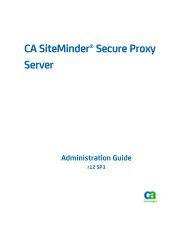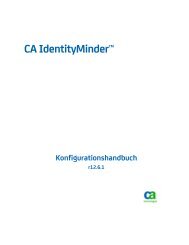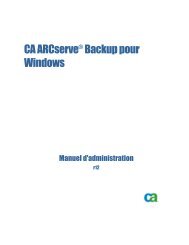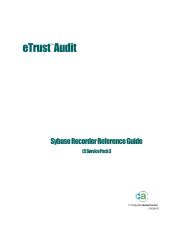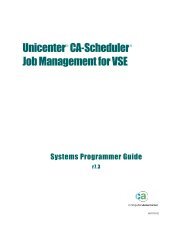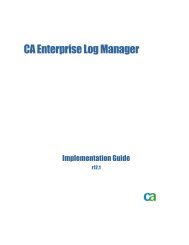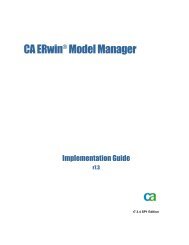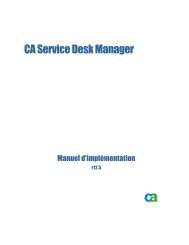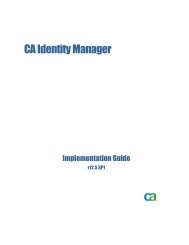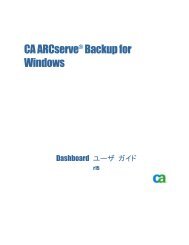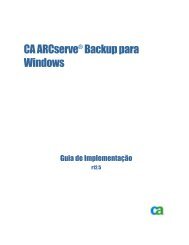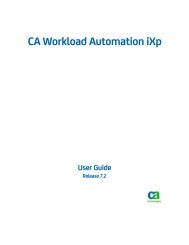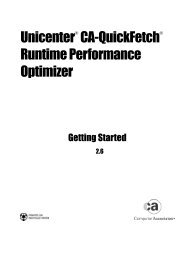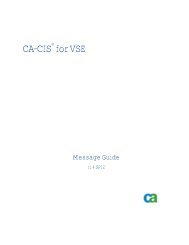Unicenter CA-Scheduler Job Management for VSE User Guide
Unicenter CA-Scheduler Job Management for VSE User Guide
Unicenter CA-Scheduler Job Management for VSE User Guide
You also want an ePaper? Increase the reach of your titles
YUMPU automatically turns print PDFs into web optimized ePapers that Google loves.
documentation batch command. A command<br />
issued through batch using the <strong>CA</strong>RUTIL0 program<br />
that is used to maintain members in the<br />
documentation file.<br />
documentation file. The <strong>Unicenter</strong> <strong>CA</strong>-<strong>Scheduler</strong><br />
file that contains documentation members. The<br />
default name of the file is <strong>CA</strong>IJDCM.<br />
events. Occurrences that <strong>Unicenter</strong> <strong>CA</strong>-<strong>Scheduler</strong><br />
monitors so it knows when predecessor conditions<br />
have been satisfied. Some of the events that<br />
<strong>Unicenter</strong> <strong>CA</strong>-<strong>Scheduler</strong> monitors are schedules and<br />
jobs starting and ending, the close of output data<br />
sets and generation data groups, and what time it is.<br />
explicit predecessor. A predecessor that is<br />
specifically defined in the criteria statement of a<br />
schedule or job. Explicit predecessors can be either<br />
of two types:<br />
■ Selection-defined explicit predecessors are<br />
predecessors that also define selection criteria.<br />
They can be schedule or job names used with or<br />
without the keywords SCD and START.<br />
■ Keyword-defined explicit predecessors are<br />
ignored in the selection process and always<br />
include one of the following keywords:<br />
DSN GDG GBLxnn DOS PRED<br />
When START or SCD are used with PRED or DOS,<br />
the result is a keyword-defined predecessor that is<br />
ignored during the selection process.<br />
<strong>for</strong>ecasting. .* previously FORE<strong>CA</strong>ST Producing<br />
reports that show which schedules and jobs will be<br />
selected <strong>for</strong> processing on any given days.<br />
General authority level. The default authority level<br />
assumed <strong>for</strong> all users unless Supervisor or Manager<br />
is specified. Allow users to:<br />
■<br />
■<br />
■<br />
Define and maintain certain schedule and job<br />
records<br />
Control and display the status of certain<br />
schedules and jobs<br />
Potentially display and alter JCL <strong>for</strong> certain<br />
staged jobs<br />
Two fields determine the scope of a General user's<br />
authority:<br />
1. The CONNECT field on each user record<br />
defines which stations that General user is<br />
authorized to access.<br />
2. The USERS field on a schedule's base record<br />
defines which General users can access that<br />
schedule and its jobs.<br />
General users are prohibited from doing anything<br />
involving stations or schedules <strong>for</strong> which they are<br />
not authorized. See authorized users as well as<br />
Supervisor and Manager authority levels.<br />
generic list. A group of schedules or jobs whose<br />
names begin with the same characters. To display,<br />
list, or analyze a generic list, specify the common<br />
characters followed by an mask character (*).<br />
global parameter. A user-controlled variable that<br />
defines a predecessor condition in criteria statements<br />
and can assume arithmetic, binary, or character<br />
values. See keyword-defined explicit predecessors.<br />
Gregorian calendar. The standard 12-month<br />
calendar which <strong>Unicenter</strong> <strong>CA</strong>-<strong>Scheduler</strong> references<br />
to interpret certain selection keywords (like<br />
WEEK-DAY) in criteria statements. You can use<br />
Gregorian calendar keywords without defining a<br />
datetable or calendars.<br />
Gregorian date. A date shown as mm/dd/yy<br />
(American <strong>for</strong>mat) or dd/mm/yy (European <strong>for</strong>mat).<br />
history file. The <strong>Unicenter</strong> <strong>CA</strong>-<strong>Scheduler</strong> file that<br />
contains history records <strong>for</strong> schedules and jobs.<br />
history record. The record that contains statistics of<br />
past runs of schedules and jobs.<br />
implicit predecessor. Predecessors that are not<br />
defined on a job's criteria statement. Because<br />
<strong>Unicenter</strong> <strong>CA</strong>-<strong>Scheduler</strong> en<strong>for</strong>ces workstation<br />
sequences, pre-CPU jobs (such as data entry and JCL<br />
staging) are implicit predecessors <strong>for</strong> CPU jobs.<br />
Likewise, CPU jobs are implicit predecessors <strong>for</strong><br />
post-CPU jobs (such as report distribution). See<br />
sequence en<strong>for</strong>cement.<br />
inactive. Schedules and jobs that are:<br />
■<br />
■<br />
Defined as REQUESTED but not activated by a<br />
REQUEST or SREQ command, and<br />
The successors of REQUESTED schedules and<br />
jobs<br />
Schedules and jobs in the inactive queue at autoscan<br />
time are purged regardless of what values have<br />
been defined <strong>for</strong> BACKLOG. The opposite of active.<br />
Glossary X-3



